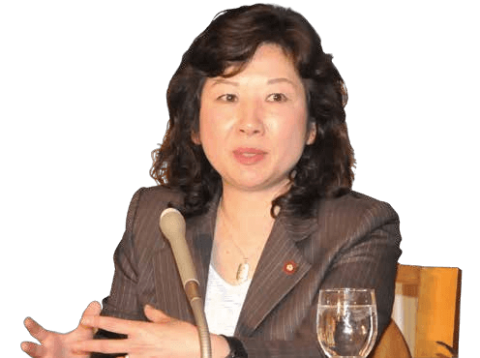Issue:
IF ANYONE CAN CRACK THE CEILING THAT STANDS BETWEEN A WOMAN AND JAPAN’S PRIME MINISTER’S POST, IT MIGHT BE THIS LDP STALWART
Liberal Democratic Party member Seiko Noda is Prime Minister Shintaro Abe’s kanban, or “billboard,” in his much touted platform for reform. She is head of the influential LDP General Council, a top policy position. She is also charming, a veteran politician and a passionate speaker for rectifying Japan’s gender malaise.
“The key to growth in Japan is diversity, and this means creating opportunities for women to become leaders,” she said at a professional luncheon at the FCCJ recently. Then she went on to unveil a dramatic remedy she wants to usher in a legally enforceable quota of 40 percent for women employees and a reward system for companies that meet the requirement.
The reasoning is plain and simple, she explained, pointing out how Japan’s male dominated corporations are led by revision resistant salarymen. “To get them to accept gender equality would become much easier if there was a law to follow,” she said.
Noda, 53, who has been touted in the past as having the potential to become Japan’s first female leader, is cleverly tying gender equality to national goals. The ruling LDP’s Abenomics has implemented drastic changes to boost Japan’s economic might now facing stiff competition from a richer and more confident Asia. Noda believes that this is a timely opportunity that must not be missed.
She believes the battle to revive growth is linked to the critical need to shore up the country’s dwindling population and that means turning the spotlight on giving women fair and equal chances. “Providing women with lives they are comortable with is a priority in population and economic recovery,” she said.

Noda quoted some somber statistics: at today’s rate of 1.3 babies per woman, Japan’s population within the next 100 years could drop to just 30 million from the current 126 million. She believes that the logic clearly calls for finally dumping Japan’s deeply entrenched gender bias.
She hasn’t hesitated from facing up to even the most entrenched foes, and has even tackled the Keidanren. She does, however, have plenty of solidarity Gold man Sachs reported last year that by better utilizing its population of working women, Japan could expand its gross domestic product by as much as 15 percent.
Noda, now in her seventh term, entered the world of grim politics as the daughter of a LDP politician from Gifu. She won her first seat in 1993. “I arrived in parliament at a time when women colleagues were extremely rare. The hardest part for me was that I just did not have a role model,” she said.
Not that much has changed. When the LDP pushed aside the Social Democrats in last year’s Lower House election, only 38 women were elected to the 480-seat chamber.
But Noda is doing her best to remedy the situation. Along with Sanae Takaiuchi, the head of the LDP Research Council, they represent the first female appointments to these important political positions, a change she seizes to showcase reform in conservative LDP policies. “My position is an important indication of prime minister, Shinzo Abe’s intentions to support women,” she told the audience.
Noda’s political career is characterized by some striking landmarks: her decision in 2005 to resign from the LDP to protest the privatization of the postal system, a ministry she headed at the age of 37, proved a severe career test. More so has been her advocacy to permit married couples to keep their maiden surnames, a proposal she clings to despite its repeated rejection by her own party.
Still, perhaps the most revolutionary of her actions while in office has been to publicize her fertility treatments documented in a book published in 2004, named Watashi wa Umitai (“I want to give birth”). This and the birth of her son at the age of 50, a process that required her to seek ova from a third party in the U.S., finally turned the spotlight on older women seeking reproductive assistance. Japanese laws do not permit surrogate mothers, another archaic law steeped in gender discrimination.
How has Noda managed in a country where women, even those who share her sharp intellect and personal charm, report bitter struggles? She offers no hard and fast answers. Rather, the woman who says she was inspired by Margaret Thatcher to enter politics, exudes personal courage, honesty and determination, traits that are essential tools for any woman who wants to get ahead.
Take, for instance, her story of being able to hold on to her seat in Gifu, located in the heart of central Japan and hardly a feminist paradise. “The secret to winning a Japanese election is not the party but your large association of supporters. It is crucial to raise the necessary funds, and this is a most daunting task for women who do not have the kind of financial network that is available to men,” she explained.
Her success in competing on such a difficult stage has won her large numbers of female fans in Japan. A young Japanese journalist vigorously typing on her laptop that afternoon at the FCCJ, summed it all up: “Noda encourages women in Japan because she displays strength and clarity; she does not fall into the typical female image of coy and cute.”
Suvendrini Kakuchi is a Sri Lankan reporter for Inter Press Service, and a regular commentator for Japanese publications and television.

